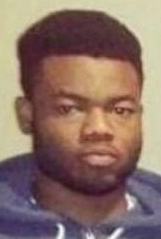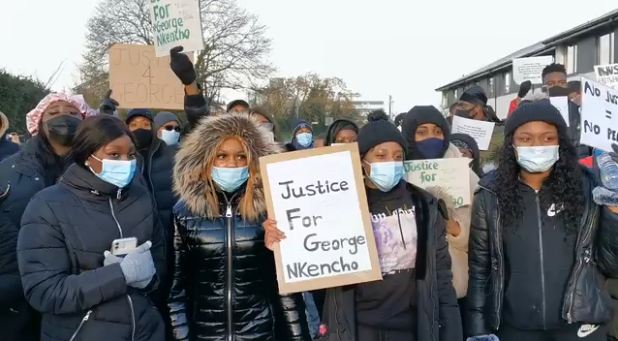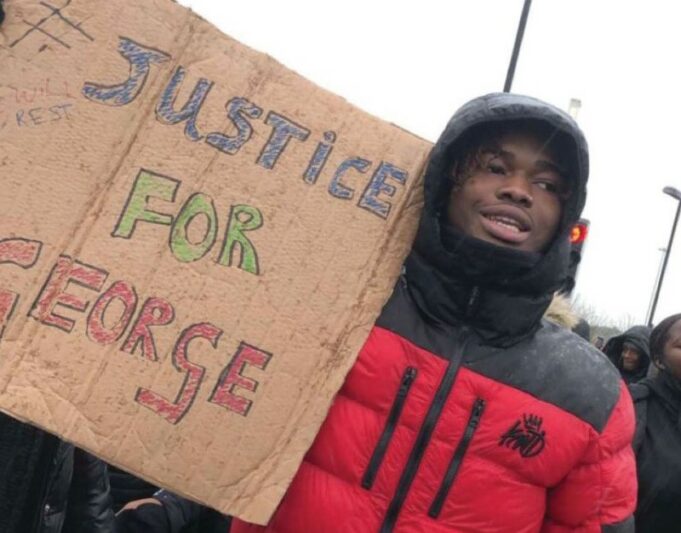Cries of “Justice for George!” and “Black Lives Matter!” rang out in front of a police station as angry demonstrators took to streets to protest the death of a Black man during a police encounter.

But their protest wasn’t calling for justice for George Floyd, who died in police custody in the United States after a police officer kneeled on his neck. They were demanding justice for George Nkencho, who was of Nigerian descent and was shot to death by an armed unit of the Irish police force.
Given the small number of Blacks in Ireland and that “Garda” officers or regular police serve as peacekeepers, a much different model than militarized policing seen on U.S. streets, the killing reverberated with Blacks in the country. Most members of the “An Garda Síochána” are unarmed. The name of the force is generally translated as “the Guardian(s) of the Peace.”
Anger was also kindled because Mr. Nkencho was having a mental crisis. Though he had a run in with a shopkeeper, many Blacks who are Irish citizens felt police did not handle the incident the same way as when Whites have brandished knives or swords, which are more common than guns in Ireland and Europe.
Zendaya lives in Ireland and is a mother. Originally from Zimbabwe, she has lived on the emerald isle with her husband and family for a couple of decades.
The killing of Mr. Nkencho was chilling and she wondered aloud if Blacks in Ireland would soon see themselves shot down in the streets of Ireland as Blacks are in America? Blacks are 1.4 percent of the Irish population. There are less than 60,000 Black people in the entire country.
Zendaya shared her thoughts and fears in an online chatroom and in an exclusive interview with The Final Call. Zendaya is not her real name and is being used to protect her from any possible repercussions. But the shooting on Dec. 30 left her stunned.
“It’s very triggering. It’s something I never thought I’d experience,” said the entrepreneur. “We have a Black young man from Nigeria who has grown up his entire life in Ireland who was involved in some criminal behavior. He went to a store and apparently beat up the owner of the store and had a knife. I accept and identify that we have a knife crime issue in Europe. But I do believe that there are ways to be able to deescalate situations given the previous incidents of knife crime and how it was handled in particular with Caucasians, I felt this was handled incorrectly.”
Mr. Nkencho had an altercation, was followed by police back home, and when he was opening the door “the special force (was) brought in and he was shot in his back,” she said. “And then when he fell down 10 seconds later, a final shot.”
“I’m a mom. I have a special needs son. He’s a young Black boy who is very strong. He suffers with ASD and multiple, sensitive processing disorders, ADHD. I hate to give labels, but it is what it is. And it triggered me that my son could be the next young Black man,” said Zendaya.
“What happened In Ireland cannot happen again because Ireland is not a (police) state. Ireland police do not carry weapons. They use non-lethal weapons in most situations. And this situation did not warrant live rounds or fire. I’m sure, you know, numerous non-lethal methods they could have used. My question is why, why they did this, why was this done in this particular way?

“If the world or people around us don’t make a stand or have the voice, will we see a pattern? It’s a problem, the general response to what took place. I mean, you just got to go to Twitter and you feel sick to your stomach with the type of comments that ‘he deserved to die,’ ” she said. “That ‘he needed to be put down.’ You get all this hate pouring out of people. And these aren’t people hiding behind Twitter fake accounts. These are actual people with real accounts with the family on the profiles. And I’m like, is this the state that I’m living in?”
There were also lies of social media saying the shooting victim was on parole and was beating his girlfriend, both are false.
The Irish Times reported demonstrators gathered outside of a Dublin police station on New Year’s Eve. The news outlet reported Mr. Nkencho “was shot at least three times in his front garden by officers from the Blanchardstown Armed Support Unit.”
“Over one hundred demonstrators gathered outside Blanchardstown Garda Station to protest the incident. Protestors were later filmed marching through Blanchardstown shopping centre before taking a knee in front of traffic. The authorities were forced to close a section of Navan Road to traffic as a result of the protest,” said the Irish Times.
“Signs featuring messages like ‘Justice for George’ and ‘Black Lives Matter’ were visible during the demonstrations.”
Leo Varadkar, a high ranking political leader, issued statements of condolences on Twitter and called for calm.

Investigators from the Garda Ombudsman are set to investigate the incident, the Irish Times said.
“As many as 12 unarmed officers followed Nkencho out of the shop and back towards his home, all while requesting that he drop the knife he was holding. Armed officers only became involved when he reached his front garden at around 12:30 pm, when the shooting occurred.
An Garda Síochána issued a statement defending a “graduated policing response,” after officers were threatened with a knife, said the Irish Times. “Pepper spray and taser guns were both deployed as attempts at use of less-than-lethal force but proved unsuccessful in de-escalating the situation,” said the Irish Times.
“Though first aid was administered, Nkencho was pronounced dead shortly after being taken to James Connolly Memorial Hospital,” said the news outlet.
“It’s a constant battle, but I suppose right now what we are now is saying no more,” said Zendaya. Blacks face discrimination in hiring, she said, citing her history of working in a human resources department.
“It’s happened in America for too long. It’s happened in the UK. It’s happened in other countries within Europe. It cannot happen (here) because then it means that a will presses at 150 percent on top of us. We are the minority in Ireland, 60,000 of us. To have one person die of that type of population, it’s too much. One is too much. We are not a majority population. We don’t even have police that represents us. We don’t have teachers; we don’t have people in authority that can speak for us. We do have counselors, but they are local counselors that don’t have the same influence or voice at a bigger level.”
People think there is no racism in Ireland, but there is racism, she said.
Black children have gone to schools and been taught about their rights and their rights to report their parents for disciplining them, but now that the young people are asserting their rights in society it’s problematic, Zendaya continued.
“And now they have a problem with their hands and they want to demonize these children. There is no law against racism. And there are no consequences,” she said.
“We had a White man who made it, he killed his wife. He abducted and killed her. He was not killed. He was given his day in court and serving his time. A White man was running in the mall, frightening people with a knife. They were able to de-escalate him, give him his day in court and he didn’t go to jail,” she said. The man paid a fine.
“I don’t want to say that every White person is bad because there are some that are very accommodating. There are some that are afraid to say anything,” she added.
“I think for the last few years, we’ve heard mostly about the stories of Black people in America going through this and we have our own experiences from where we come from in terms of discrimination and possibly segregation in some ways,” Zendaya said.
In the Clubhouse app chatroom, she was “hoping to hear one more, two or four brothers and sisters say, ‘look, we have this issue in this country, but this is how we won over this issue.’ And I’m thinking, ‘well, are we going to win as a people?’ When are we going to have examples where we’ll be saying, ‘Oh, we did this and you can do a creative this way so that you can also have that victory in the sense of better policing rules and having better relationship with the police.’ ”
Shona, who works with charities in the United Kingdom, is from also from Zimbabwe. She has seen policing problems in the country. Her 17-year-old nephew says when he sees police officers in the UK, he runs away to protect himself, she said. She was in chatroom and disturbed by the killing.
A 33-year-old IT professional, who lives in America and is a first generation migrant from Nigeria, shared the chatroom with Zendaya, Shona and others. He lives in Oakland and his family has been in the U.S. since 1960. When he heard about the death of George Nkencho, his mind turned to the police killing of Oscar Grant, an unarmed Black man lying down on a subway platform and under police control New Year’s Day 2009. A transit officer fired a gun into Mr. Grant who was not resisting and laying on his stomach. The cop was convicted of a crime but did minimal jail time.
“The first thing that came to my mind was just failure, and negligence. The first thing that came to my mind is that this global caste system that some call White supremacy, which I call White terrorism. It’s really, it’s really global. And just the fear of Black men and Black people, in general, it’s a global thing. The second thing that came up that came to my mind was the doctor that just recently passed away from covid. She filmed herself talking about how she was being underserved, how the doctors were treating her there. Then they see after she had passed away, the CEO of the hospital came out and said that, you know, they weren’t treating her because they were intimidated by her. Right? So now you have a doctor who is sick, just asking for proper care and that’s even intimidating.”













